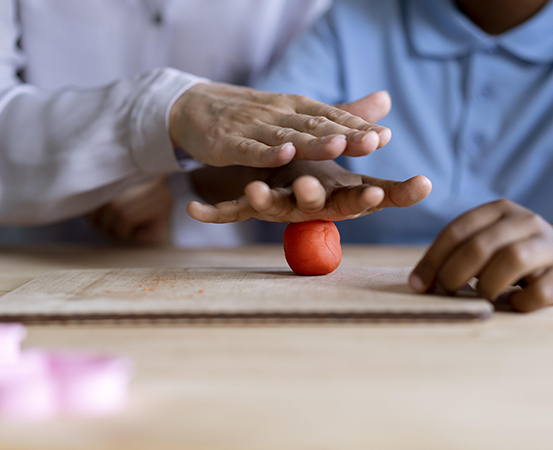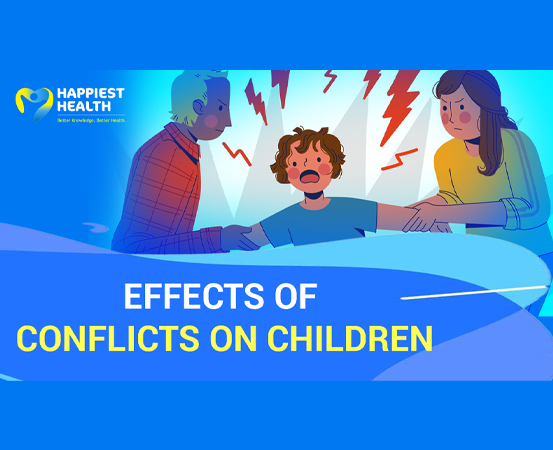
The current world requires kids to grow up ahead of their time. The challenges kids face today are completely different from the challenges faced by kids a few decades ago. Today’s children are under immense pressure to perform, excel, be up to date socially with their peers, manage their interpersonal issues in school or sometimes even issues with dysfunctional families at home. Everything around them seems to pull them into a vortex that is scary and not every child has the mental resource to survive the pull. So, parents should look out for their child’s mental well-being along with physical well-being.
What is mental health?
“I’m not ok.”
This statement from a child may not always denote physical illnesses; it can have multiple meanings and parents should understand the first signs of declining mental health.
Mental health in children broadly indicates their social and emotional well-being. It encompasses the ability to cope with problems as and when they arise, with a little help from parents and educators.
In school and at home, they need a support system that hears, counsels and helps them in an unbiased manner. Children are very different from adults in the way they think and behave, so their decisions will be different too. The trick is to be non-judgmental, give them a shoulder to lean on and an unbiased ear to vent out their worries, at any given time of their budding years.
“Studies indicate that currently, mental health problems in children are increasing as there are multiple challenges post the pandemic; one of the prime concerns is over-dependence on social media leading to digital addiction. Consequently, these are leading to increased cases of anxiety, depression and other behavioural disturbances,” says Dr Sandeep Vohra, psychiatrist and clinical psychologist at Indraprastha Apollo hospitals, New Delhi.
READ MORE :
How to make the most of weekend parenting
Ways to discuss sensitive topics with kids
Signs and symptoms
Every child with a mental health issue may not necessarily have a mental disorder. The World Health Organisation (WHO) defines mental health as ‘a state of mental well-being that enables people to cope with the stresses of life, realise their abilities, learn well and work well, and contribute to their community.’ On the other hand, a mental disorder is a clinically significant disturbance in an individual’s cognition, emotional regulation, or behaviour.
Nitin Jha, 46, a real estate consultant says, “my 16-year-old son started losing interest in his studies and was exhibiting strange behaviour. We thought he could have a mental disorder. Whenever we would try to talk to him, he would not look at us or speak to us. His mother and I tried our best and it was exceedingly difficult for months until we sought professional help. It was diagnosed that he was under immense stress due to a breakup with his girlfriend. It took a year of counselling and efforts from us to get him back on track.”
Ms Anuna Bordoloi, a consultant clinical psychologist at Fortis Healthcare, New Delhi emphasises, “any sudden changes of behaviour noted by parents — like increased irritability, sudden withdrawal, extreme anxiety or fear, nightmares or sleeplessness/oversleeping, changes in eating patterns — can suggest mental health issues in the child. If parents observe such symptoms, then seeking help from a medical professional (paediatrician, general physician or a clinical psychologist) is advisable to address the issue better.”
Catch them early
Between the age of three and 16, children require support and sound advice to steer through their social and emotional obstacles smoothly. While it is common for most children to have minor interpersonal or emotional issues, all they need is careful handling to show the way forward and help them in their cognitive and socio-emotional skills to become balanced and mature adults. That is why children’s mental health should be a top priority for any parent.
“In half of the adult population, severe mental health illness begins before 14 years as the behavioural and cognitive (thought) patterns learnt in early age continue to exist for the adult periods as well. The environmental factors and coping skills can be learnt more robustly in this period. There is so much stress with social media, increasing influence and exposure to the internet, smaller families, higher screen time, bullying (both virtual and real-world) and so many others; psychological coping skills like empathy, resilience, confidence, self-belief and trust are needed. It is easier for children to learn these skills when they are younger,” explains psychiatrist Dr Paramjeet Singh of Pushpawati Singhania Hospital & Research Institute (PSRI), New Delhi.
Dr Singh recalls a few case studies of children he encountered in his professional life. “A nine-year-old girl had an online gaming addiction. It was so bad that she would sit for hours playing only those games and refuse to do anything else. In another case, a ten-year-old boy, who was average in his studies and faced a lot of criticism from parents and teachers, suffered from low self-esteem and his academic performance fell further. It was a vicious circle with no relief in sight until parental education and counselling helped to get his confidence back,” says Dr Singh.
In India, children with mental health issues are either hesitant in seeking help or left undiagnosed. The Indian Journal of Psychiatry in 2019 claims, even before the pandemic, at least 50 million children in India were affected by mental health issues; 80 – 90 per cent have not sought support. That broadly goes to show how these matters are usually swept under the carpet.
It’s important to watch out for signs early if there is an issue of mental health, says Dr Vohra. “A child’s mental health determines how he/she will develop as an individual and contribute to self, family and society. Many of the psychiatric disorders develop in childhood which can lead to disturbed development in adulthood causing immense burden to the society,” he adds.

















